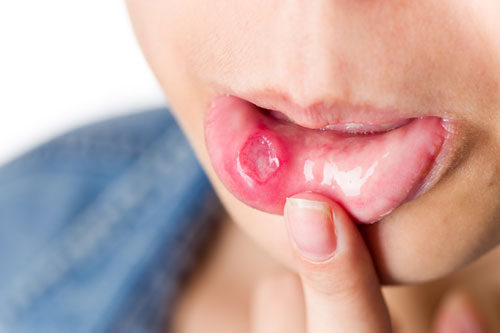A mouth ulcer is a sore that appears anywhere inside your mouth. These sores are usually red, yellow or white, and you might have one or several.
You can get mouth ulcers on your:
- Gums.
- Tongue
- Roof of mouth (palate).
- Inner cheeks.
- Inner lips.
These sores are often painful and can make eating, drinking and speaking uncomfortable. Mouth ulcers can be alarming. However, they’re not a sexually transmitted infection (STI) and you can’t get or spread them from kissing or sharing food and drinks. Aside from any pain and discomfort, mouth ulcers are usually harmless and go away on their own in a week or two. But some types of mouth sores could point to underlying health conditions like viruses, autoimmune diseases or gastrointestinal issues.

SYMPTOMS AND CAUSES
Mouth ulcers are usually easy to spot. They appear as sores on your gums, tongue, inner cheeks, inner lips or roof of your mouth.
Mouth sores are typically:
- Red around the edges.
- White, yellow or gray in the center.
You may only develop one ulcer, or there might be more. Other symptoms could include:
- Swelling around the ulcers.
- Increased soreness when brushing your teeth
- Pain that worsens when eating spicy, salty or sour foods.
What causes mouth ulcers?
Mouth ulcers may occur for a number of reasons, including:
- Minor tissue injury from dental work, such as having a cavity filled.
- Accidentally biting your cheek or tongue.
- An allergic reaction to certain bacteria
- Wearing braces or retainers.
- Using harsh or abrasive toothpaste.
- Eating lots of acidic foods, such as oranges, pineapples and strawberries.
- Hormonal charges during your period
- Stress
- Lack of sleep.
Are mouth ulcers contagious?
No. Unlike cold sores, mouth ulcers aren’t contagious, and they can’t spread through kissing or sharing food.
Cold sores (fever blisters) appear on the outside of your mouth, often on your lips. A virus causes them, and they’re very contagious. If you have a fever blister, you should avoid sharing personal items with other people to reduce the spreading of the virus.

DIAGNOSIS AND TESTS
How do health providers diagnose mouth ulcers?
A healthcare provider can diagnose a mouth ulcer with a visual examination. If you have a severe breakout, or if they suspect a specific health condition, they may order blood tests
MANAGEMENT AND TREATMENT
How do you treat a mouth ulcer?
While most mouth sores heal on their own, your provider may prescribe medications to help ease discomfort. Common mouth ulcer treatments include:
- Antiseptic gels or mouth rinses like Orajel™ or Anbesol®.
- Steroid ointments like triamconolone
- Immunosuppressents (in severe cases).
How to cure mouth ulcers fast naturally
There are also things you can do at home to relieve mouth sore symptoms:
- Drink plenty of water.
- Practice good oral hygiene to keep your mouth as clean as possible.
- Rinse your mouth with warm saltwater a few times each day.
- Make a mixture of equal parts hydrogen peroxide and water and rinse your mouth twice a day.
- Avoid hot and spicy foods until the ulcer heals.
- Use an over-the-counter (OTC) topical anesthetic like Orajel™ or Anbesol®.
PREVENTION
Can I prevent mouth ulcers?
While you can’t prevent mouth ulcers altogether, there are things you can do to reduce your risk:
- Brush your teeth twice daily and floss once daily for optimal oral health.
- Use a soft-bristled toothbrush to avoid tissue irritation.
- Eat a healthy diet rich in fresh fruits and vegetables.
- Visit Gurgaon Dental lounge for regular checkups.
